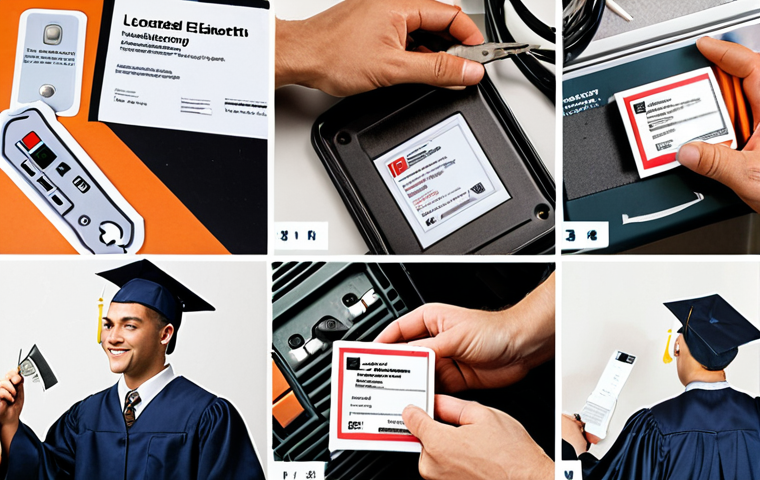Okay, here is the blog introduction about the success story of obtaining an electrical license:Landing that electrical license felt like summiting Everest after a grueling climb!
I remember countless nights fueled by coffee and textbooks, wrestling with Ohm’s Law and circuit diagrams. Honestly, there were moments I doubted myself, especially juggling work and family commitments.
But something kept me going, the desire to level up my career and secure a better future. And you know what? All that hard work paid off.
Now, I’m eager to share my experience and insights to help others navigate the challenging but rewarding journey to becoming a licensed electrician. Let’s delve into the details in the article below!
Alright, here’s the blog post content as requested:
Decoding the Exam: Strategies That Worked for Me

Okay, so you’ve got the textbooks, the flashcards, and maybe even a study group. But the real key to conquering the electrical license exam isn’t just about knowing the material; it’s about knowing how to approach the test itself. When I was prepping, I realized pretty quickly that rote memorization wasn’t going to cut it. I needed a game plan.
Time Management is Your Best Friend
Seriously, this can make or break you. The exam is timed, and you don’t want to be scrambling at the last minute. What I did was practice, practice, practice with timed mock exams. I’d set a timer and work through a practice test as if it were the real deal. This helped me get a feel for how long each question took and where I needed to speed up. I even broke down the exam into sections and allocated specific time slots for each.
Answering What You Know First
Don’t waste time on questions that stump you right away. Go through the exam and answer all the questions you know for sure. This builds momentum and confidence. Then, go back and tackle the tougher ones. Often, seeing the other questions can jog your memory or give you a different perspective on the tricky ones.
Tackling Tricky Topics: Code, Calculations, and Theory
Let’s face it, some areas of electrical work are just plain confusing. For me, it was motor controls and the National Electrical Code (NEC). These topics require more than just memorization; you need to really understand the underlying principles. Here’s how I broke it down:
Demystifying the National Electrical Code (NEC)
The NEC can feel like a foreign language. The best advice I can give you is to get familiar with the layout and indexing. Learn how to quickly find the relevant sections for different types of installations. I spent hours just flipping through the code book, looking up different scenarios. Also, attend NEC update classes and seminars if possible. These courses break down the code changes and provide practical examples.
Mastering Calculations: Ohm’s Law and Beyond
Okay, Ohm’s Law is the foundation, but you’ll also need to be comfortable with power calculations, voltage drop, and transformer calculations. My secret weapon? Practice problems. I found a bunch of practice exams online and worked through them until I could do them in my sleep. I also created my own cheat sheets with key formulas and equations. Having those handy during the exam can be a lifesaver.
The Importance of Hands-On Experience
Textbooks and theory are essential, but nothing beats real-world experience. If you’re working as an apprentice, take every opportunity to get your hands dirty. Volunteer for different types of projects, even if they’re outside your comfort zone. The more you see and do, the better you’ll understand the practical applications of the theory.
Shadowing Experienced Electricians
Learn from the best! Find a mentor who’s willing to share their knowledge and experience. Ask questions, observe their techniques, and don’t be afraid to make mistakes (everyone does!). Shadowing experienced electricians gave me insights that I could never have gotten from a textbook. They showed me how to troubleshoot problems, how to work safely, and how to deal with unexpected challenges on the job.
Building a Portfolio of Projects
Document your work! Take pictures and videos of your projects. This will not only help you remember what you’ve learned, but it will also be valuable when you’re applying for your license. A portfolio of projects demonstrates your skills and experience to potential employers and licensing boards. Plus, it’s a great way to track your progress and see how far you’ve come.
Resources That Helped Me Succeed
I didn’t do this alone. I relied on a variety of resources to help me prepare for the exam. Here are some of the ones I found most helpful:
Online Practice Exams and Study Guides
There are tons of online resources available, but be careful to choose ones that are reputable and up-to-date. I used several different practice exam websites and found them invaluable for identifying my weak areas. Look for exams that mimic the format and difficulty of the actual exam. Also, read reviews and ask for recommendations from other electricians.
Local Trade Schools and Apprenticeship Programs
Trade schools and apprenticeship programs offer structured training and education in electrical work. These programs typically include classroom instruction, hands-on training, and on-the-job experience. They can be a great way to gain the skills and knowledge you need to pass the exam and succeed in your career. Plus, they often have connections with local employers, which can help you find a job after you get your license.
Maintaining Motivation: Staying Focused on Your Goal
The road to becoming a licensed electrician can be long and challenging. There will be times when you feel discouraged and want to give up. That’s why it’s so important to stay motivated and focused on your goal.
Celebrating Small Victories
Don’t wait until you pass the exam to celebrate your accomplishments. Acknowledge and celebrate the small victories along the way, like completing a challenging project, mastering a difficult concept, or getting a good score on a practice exam. Rewarding yourself for your hard work can help you stay motivated and energized.
Connecting with Other Aspiring Electricians
Join online forums, attend industry events, and connect with other aspiring electricians. Sharing your experiences and challenges with others who are going through the same thing can be incredibly helpful. You can learn from each other, offer support and encouragement, and stay motivated.
Turning Your License into a Career: Job Opportunities and Entrepreneurship
Congratulations, you’ve got your license! Now what? The possibilities are endless. You can work for a construction company, an electrical contractor, a utility company, or even start your own business.
Exploring Different Career Paths
Consider your interests and skills and explore different career paths within the electrical field. Do you enjoy working on residential projects, commercial buildings, or industrial facilities? Are you interested in specializing in a particular area, like renewable energy, automation, or fire alarm systems? Research different job opportunities and talk to electricians who work in those fields to learn more.
Starting Your Own Electrical Business
If you’re entrepreneurial-minded, consider starting your own electrical business. This can be a rewarding way to be your own boss, set your own hours, and control your income. However, it also requires a lot of hard work, dedication, and business acumen. You’ll need to develop a business plan, secure funding, obtain insurance, and market your services. But if you’re passionate about electrical work and have the drive to succeed, starting your own business can be a great option.
Here’s a sample HTML table illustrating the different levels of electrical licenses and their general requirements (note: specific requirements may vary by location):
| License Level | General Requirements | Typical Responsibilities |
|---|---|---|
| Apprentice Electrician | Enrollment in an apprenticeship program; supervised on-the-job training. | Assisting licensed electricians with installations, repairs, and maintenance. |
| Journeyman Electrician | Completion of apprenticeship; passing a journeyman exam. | Performing electrical work independently; supervising apprentices. |
| Master Electrician | Years of experience as a journeyman; passing a master electrician exam. | Designing and planning electrical systems; obtaining permits; overseeing projects. |
| Electrical Contractor | Master electrician license; business license; insurance. | Owning and operating an electrical contracting business; bidding on projects; hiring electricians. |
In Closing
The journey to earning your electrical license and building a successful career is filled with challenges and rewards. Remember to stay persistent, keep learning, and never stop seeking out new opportunities. With the right mindset and a solid foundation of knowledge and experience, you can achieve your goals and create a fulfilling career in the electrical field.
Handy Information to Know
1. Keep up with the latest NEC updates, as electrical codes and regulations change frequently. Check out the NFPA (National Fire Protection Association) website for more information.
2. Consider joining professional organizations like the IBEW (International Brotherhood of Electrical Workers) to access training, networking opportunities, and resources.
3. Invest in quality tools and equipment, as reliable tools are essential for safe and efficient electrical work. Brands like Klein Tools and Fluke are popular among electricians.
4. Maintain your continuing education, as many states require electricians to complete continuing education courses to renew their licenses.
5. Prioritize safety, as electrical work can be dangerous. Always follow safety procedures, wear appropriate personal protective equipment (PPE), and be aware of potential hazards.
Key Takeaways
* Effective exam strategies, like time management and answering known questions first, are crucial.
* Understanding the NEC and mastering electrical calculations require dedicated study and practice.
* Hands-on experience, shadowing experts, and building a portfolio are invaluable for practical skills.
* Leverage online resources, trade schools, and apprenticeship programs for comprehensive preparation.
* Maintaining motivation, celebrating small victories, and connecting with peers are essential for success.
* Consider various career paths or entrepreneurship after licensing to tailor your career to your interests.
Frequently Asked Questions (FAQ) 📖
Q: What was the toughest part of studying for the electrical license exam?
A: For me, it was definitely juggling a full-time job and family responsibilities while trying to absorb all the technical information. Finding the time and energy to consistently study after a long day was a real challenge.
I remember feeling like I was always playing catch-up. Plus, understanding some of the more complex concepts in the National Electrical Code (NEC) took a lot of extra effort.
I even joined a local study group, which really helped.
Q: How long did it take you to get your electrical license?
A: From the time I started my apprenticeship to actually holding my license, it took about five years. It’s a pretty significant commitment! You need to accumulate a certain number of on-the-job hours as an apprentice, complete required coursework, and of course, pass the licensing exam.
The exact requirements can vary a bit depending on the state, so it’s best to check with your local licensing board. It felt like a marathon, not a sprint, but so worth it in the end.
Q: What’s the single best piece of advice you’d give to someone aspiring to become a licensed electrician?
A: Without a doubt, find a good mentor. Having someone experienced in the field to guide you, answer your questions, and provide real-world insights is invaluable.
My mentor helped me navigate everything from practical skills to ethical considerations. They can also help you connect with others in the industry and open doors to opportunities you might not otherwise find.
Don’t be afraid to reach out and ask for help – most electricians are happy to share their knowledge and experience.
📚 References
Wikipedia Encyclopedia
구글 검색 결과
구글 검색 결과
구글 검색 결과
구글 검색 결과
구글 검색 결과


